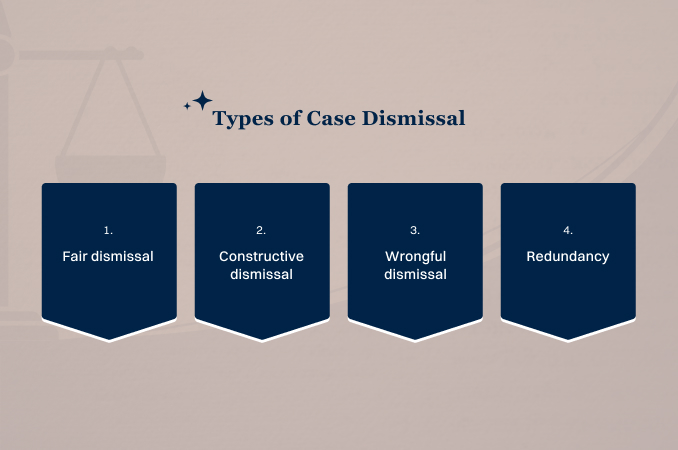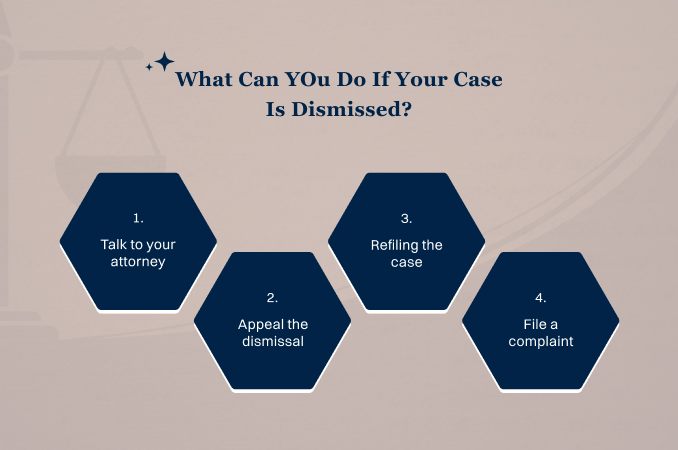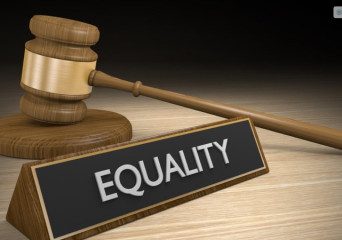
Table Of Contents
What Happens When a Case is Dismissed in Court? Is It the End?
What happens when a case is dismissed in court is a question that often comes up when someone is dealing with the stress of being involved in a legal matter.
Whether you’re the person being accused or someone close to them, understanding what a dismissal actually means can give you some clarity and peace of mind.
A dismissal doesn’t always mean “case closed forever.” But it does mean that the court has chosen not to move forward with the charges or lawsuit—at least for now.
This could happen because of missing evidence, a legal error, or a violation of your rights. But what are these?
In this article, I will walk you through what dismissal means, when it happens, what it leads to, and what your rights are moving forward. So, if that is something you want to know, keep reading…
When Is A Case Dismissed?

A case is dismissed when a judge decides that the legal process should not continue for one reason or another. This can happen at various stages in the court process, but it often happens early on—sometimes even before the trial begins.
For instance, during a pretrial conference, where both parties meet to discuss the issues before trial, the judge might find clear problems with the case.
These problems might be things like weak evidence, a mistake in the legal paperwork, or a violation of the accused person’s rights.
Many people begin to suspect something is wrong before this stage by noticing signs your case will be dismissed—like missing witnesses or illegal searches.
When these red flags are raised and brought to the court’s attention, the judge may decide to throw out the case entirely. A dismissal means the charges or claims won’t move forward unless something changes.
What Happens When a Case is Dismissed in Court?
When a case is dismissed in court, it means the court has decided not to continue with the legal process. This can be a huge relief if you’re the defendant, but it’s important to understand what it actually means and what it doesn’t.
First, dismissal doesn’t always equal innocence. It means the court could not or would not proceed with the case based on the information available or how the case was handled.
A dismissal can happen for many reasons—lack of evidence, mistakes by the police, or a violation of your constitutional rights.
There are two main types of dismissal:
- With prejudice: This means the case is closed for good. It cannot be refiled or reopened. The prosecution or plaintiff cannot bring the same charges or claims against you again.
- Without prejudice: This means the case is dismissed for now, but it could be brought again in the future if new evidence comes up or if the prosecutor fixes certain issues.
Dismissals can happen in both criminal and civil cases. In criminal cases, it may mean that the person no longer faces jail time, fines, or a criminal record—at least for the time being.
In civil cases (like lawsuits), it means the legal claim is ended unless the plaintiff refiles the case.
Key Aspects of Case Dismissal
Understanding the key details of a dismissal helps you prepare for what’s next:
- Your record: If your case is dismissed, it may still show up on your record unless it is sealed or expunged. You’ll need to speak with a lawyer to clean up your record if necessary.
- Bail or bond: If you were out on bail, you might get your bail money back depending on your state’s rules and the type of dismissal.
- Emotional relief: Many people feel an emotional weight lifted off their shoulders when a case is dismissed. But it’s important to remain cautious, especially if the dismissal is without prejudice.
- Employment and future background checks: A dismissed case may still appear in background checks. This could affect job opportunities unless the case is expunged.
A dismissal is not the end of the world—but it’s also not a free pass to ignore the situation. It’s an opportunity to take control of your next steps carefully.
Can You Reopen a Dismissed Case?
This depends on how the case was dismissed.
If the case was dismissed with prejudice, then no—it’s officially closed. That means the prosecutor or the other party can’t bring it back to court.
This type of dismissal usually happens when the judge believes there is no legal reason for the case to continue or if there was a serious mistake made by the prosecution.
If the case was dismissed without prejudice, it can be reopened. This usually means the court believes the case had issues that could potentially be fixed.
For example, if the prosecutor didn’t file the right documents, they might correct the mistake and refile the case. That’s why it’s important to know what type of dismissal you received.
Sometimes people wrongly believe a dismissal means they are completely free of the case forever. That’s not always true—so make sure you or your lawyer understands whether your case can be reopened or not.
What To Do If Your Case Is Dismissed Unjustly?

There are situations where a case is dismissed unfairly or for the wrong reasons. This usually affects the person who filed the case—like a victim or plaintiff in a civil case.
Maybe the judge misunderstood the facts, or the other side manipulated the process. If you believe your case was dismissed unjustly, don’t give up.
Here’s what you can do:
- Talk to your attorney: Your lawyer can help you understand the reason for the dismissal and what your options are.
- Appeal the dismissal: In some cases, you may be able to appeal the judge’s decision. This means asking a higher court to review the case.
- Refiling the case: If your case was dismissed without prejudice, you may have the right to fix the issues and file again.
- File a complaint: If your case involved misconduct by a judge, police officer, or prosecutor, you may be able to file a complaint or request a review.
Justice should be fair for everyone. If your case was dismissed in a way that feels wrong, you have the right to seek answers and continue fighting for what’s right.
Your Exclusive Rights in a Case
Legal matters can feel complicated and intimidating, but you have rights—no matter who you are. Knowing what happens when a case is dismissed in court can help you better protect yourself or someone you care about.
Dismissals can happen for good reasons, like protecting your rights or recognizing unfair treatment. But it’s important to know whether the case is truly over or if it might come back.
Don’t assume everything is resolved just because the judge dismissed the case. Talk to a lawyer. Ask questions. Understand your rights.
You deserve clarity, fairness, and a second chance if the system gets it wrong. And if your case is over for good, then you deserve peace and closure.
The legal system isn’t perfect, but your voice matters—and you don’t have to face it alone.
Read Also:









